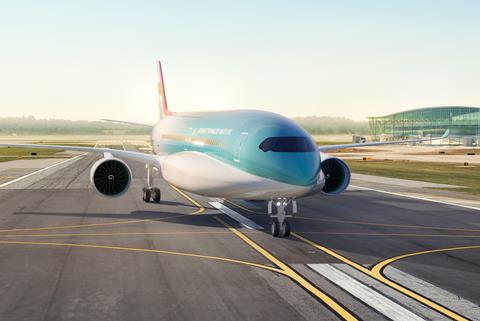FlyZero’s mid-size concept has done more than capture public imagination – it offers a true glimpse of what is to come, says project director Chris Gear.
FlyZero recently shared details of its liquid hydrogen-powered mid-size concept aircraft capable of carrying 279 passengers non-stop from London to San Francisco, or to Auckland with a single stop.
With a range of 5,250nm (9,710km), the concept pushes the boundaries of advanced technologies to address aviation’s carbon challenge, while offering the same speed and passenger comfort as the existing global fleet.

From the response we’ve seen, the mid-size concept certainly captured the public imagination, with coverage around the world in Egypt, France, Germany, Indonesia, Japan and Russia, to name a few.
It is clear people are excited about the prospect of keeping families, businesses and nations connected without the carbon footprint. It is also exciting for engineers and aviation professionals taking on the challenge of bringing these technologies into reality.
While the mid-size design will remain a concept – one of three, along with a regional and a narrowbody – it is providing a means to identify, investigate and validate the technologies needed to deliver zero carbon-emission flight.
By driving forward development of these technologies and considering the possible configurations and components of the next generation of aircraft, FlyZero will help the UK aerospace sector and its supply chain prepare for the future.
The project brings together 100 aviation specialists from all around the UK, to consider how to address the carbon challenge facing the industry as part of a one-of-a-kind initiative, led by the Aerospace Technology Institute (ATI) and backed by the UK government.
ECONOMIC POTENTIAL
This is an imperative challenge for our sector and one we must overcome to protect our planet and make the most of the economic potential the transition to zero-carbon technologies will bring. We have also been tapping into specific skills and expertise within UK industry and academia to extend our reach and make the most of the broad capability Britain has to offer.
Our remit is to identify and explore the potential of the technologies required to realise zero carbon-emission flight by the end of the decade. It is vital that we ensure the UK does not miss its chance to be in a strong position at the start of what will certainly be a major commercial opportunity for aerospace businesses big and small.
FlyZero is not considering technology development in isolation, however. Over the past 12 months, the team has performed detailed analysis of the changes required for airlines, aircraft traffic management systems and airports.
We have been working with partner airlines and airports to look at the real world infrastructure and operational challenges. We have also been considering sustainability from the full aircraft lifecycle perspective, from materials and manufacturing through to end-of-life, and investigating the commercial and economic implications of zero-carbon operations.
FEASIBLE OBJECTIVE
From our work we can see that zero carbon-emission flight is feasible. It is not easy, we all know it is going to be hard to achieve, but this is what we need to do if we want to protect the environment.
Zero-carbon technologies are still very much in their infancy, and a potential entry into service for liquid hydrogen-powered large commercial aircraft looks likely to be in the 2030s. In the interim, there is clearly a need to develop low carbon solutions for the existing global fleet, including sustainable aviation fuels.
Early in 2022, FlyZero will publish a series of reports that set out the technology roadmaps for delivering zero carbon-emission commercial flight, to support and inform the UK aerospace sector and its supply chain about what comes next, to help them build the right skills and position themselves strategically. We are looking forward to sharing these findings in depth with industry and academic colleagues across the UK through both ATI and industry events.
Chris Gear is project director for FlyZero, a UK industry initiative advancing zero carbon-emission flight technologies.


























